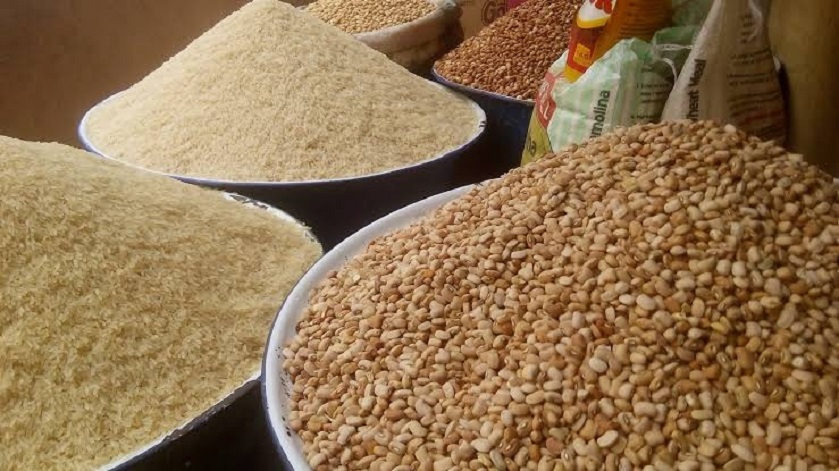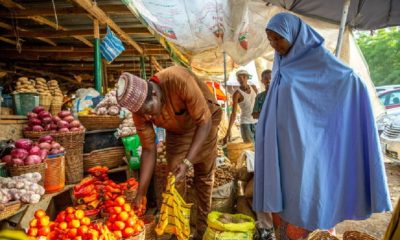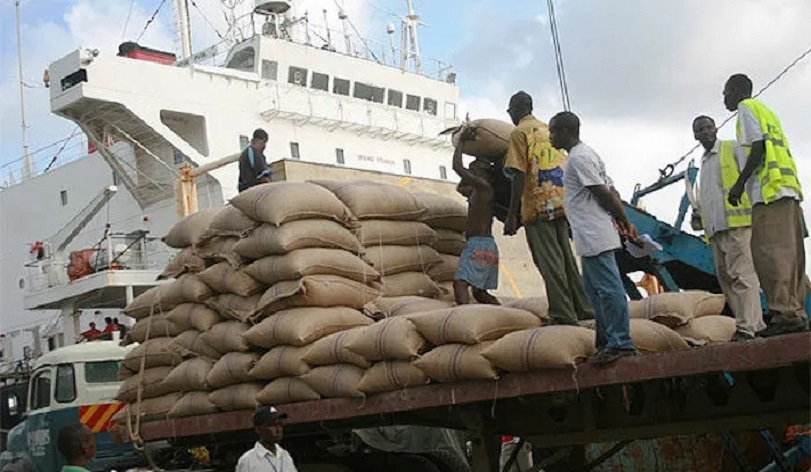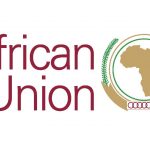World
World Food Prices Rise for First Time in Seven Months in March 2024

By Adedapo Adesanya
After seven months of decline, global food prices ticked in March, mostly driven by higher world vegetable oil prices, data from the United Nations Food and Agriculture Organisation (FAO) showed.
The FAO Food Price Index (FFPI) stood at 118.3 points in March 2024, up 1.3 points (1.1 per cent) from its revised February level.
This is as increases in the price indices for vegetable oils, dairy products and meat slightly more than offset decreases in sugar and cereals.
The index, although it registered a first uptick in March following a seven-month-long declining trend, was down 9.9 points (7.7 per cent) versus its corresponding value one year ago.
The FAO Cereal Price Index averaged 110.8 points in March, down 3.0 points (2.6 per cent) from February and 27.7 points (20.0 per cent) below its March 2023 value.
Global wheat export prices declined for the third consecutive month in March, mostly due to continued strong export competition among the European Union, the Russian Federation and the United States of America. Amid ample supplies, cancelled wheat purchases by China (from both Australia and the United States of America) placed downward pressure on markets, while favourable crop prospects for the 2024 harvest in the Russian Federation and the United States of America also contributed to the softer price tone.
By contrast, maize export prices edged marginally upward month-on-month. Increasing buying interest, especially from China, amidst logistical difficulties in Ukraine and elsewhere, provided some support to maize prices, but it was countered by seasonal pressure in Argentina and Brazil where harvests are underway.
For other coarse grains, world prices of barley fell while those of sorghum increased in March.
The FAO All Rice Price Index declined by 1.7 per cent in March, largely reflecting a subdued global import demand.
The FAO Vegetable Oil Price Index averaged 130.6 points in March, up 9.7 points (8.0 per cent) from February and reaching a one-year high.
The marked rebound reflected higher price quotations across palm, soy, sunflower and rapeseed oils. International palm oil prices continued to increase in March, underpinned by seasonally lower outputs in leading producing countries that coincided with firm domestic demand in Southeast Asia. In the meantime, world soy oil prices recovered from multi-year lows, mostly supported by continued robust demand from the biofuel sector, particularly in the United States and Brazil.
Likewise, sunflower and rapeseed oil prices recovered in March, amid rising global import demand. Furthermore, higher crude oil prices also contributed to the increase in vegetable oil quotations.
The FAO Dairy Price Index averaged 124.2 points in March, up 3.5 points (2.9 per cent) from February, marking the sixth consecutive monthly increase, but remained 11.1 points (8.2 per cent) below its value in the corresponding month last year.
In March, world cheese prices increased the most, reflecting the steady import demand from Asia, higher internal sales in Western Europe leading to the spring holidays, and seasonally falling production in Oceania.
Despite softer Asian demand, international butter prices increased further in March, mainly due to solid seasonal demand and somewhat tighter European stocks.
By contrast, after five months of consecutive increases, international whole milk powder prices dropped as global import demand softened despite seasonally declining production in Oceania.
Meanwhile, Skim milk powder prices also fell, as markets remained quiet, with lower spot demand.
The FAO Meat Price Index averaged 113.0 points in March, up 1.9 points (1.7 per cent) from February, marking the second consecutive monthly increase. At this level, the index stood only 1.7 points (1.5 per cent) below its corresponding value a year ago.
International poultry meat prices increased in March, underpinned by continued steady import demand from leading importing countries, despite ample supplies mostly sustained by reduced avian influenza outbreaks in major producing countries.
Pig meat prices also increased, mainly reflecting higher internal demand ahead of the Easter holidays, notwithstanding increased supplies, especially in Western Europe.
World bovine meat prices continued to rise in March, mainly due to increased purchases by leading importing countries. By contrast, international ovine meat prices fell for the second consecutive month, principally driven by a surge in supplies exceeding seasonal levels, especially from Australia.
The FAO Sugar Price Index averaged 133.1 points in March, down 7.6 points (5.4 per cent) from February after two consecutive monthly increases, but still up 6.1 points (4.8 per cent) from its value a year ago.
The upward revision mainly drove the March decline in international sugar price quotations to the 2023/24 sugar production forecast in India and the improved pace of sugar harvest in Thailand at the final stage of the season. Large exports from Brazil also weighed on world sugar prices.
However, persistent concerns over the crop in Brazil, negatively affected by prolonged dry weather conditions, continued to exacerbate seasonal trends and limited the price decline. Likewise, higher international crude oil prices also contributed to containing the decrease in world sugar prices.
World
Russia Expands Military-Technical Cooperation With African Partners

By Kestér Kenn Klomegâh
Despite geopolitical complexities, tensions and pressure, Russia’s military arms and weaponry sales earned approximately $15 billion at the closure of 2025, according to Kremlin report. At the regular session, chaired by Russian President Vladimir Putin on Jan. 30, the Commission on Military and Technical Cooperation with Foreign Countries analyzed the results of its work for 2025, and defined plans for the future.
It was noted that the system of military-technical cooperation continued to operate in difficult conditions, and with increased pressure from the Western countries to block business relations with Russia. The meeting, however, admitted that export contracts have generally performed sustainably. Russian military products were exported to more than 30 countries last year, and the amount of foreign exchange exceeded $15 billion.
Such results provide an additional opportunity to direct funds to the modernization of OPC enterprises, to the expansion of their production capacities, and to advanced research. It is also important that at these enterprises a significant volume of products is civilian products.
The Russian system of military-technical cooperation has not only demonstrated effectiveness and high resilience, but has created fundamental structures, which allow to significantly expand the “geography” of supplies of products of military purpose and, thus strengthen the position of Russia’s leader and employer advanced weapons systems – proven, tested in real combat conditions.
Thanks to the employees of the Federal Service for Military Technical Cooperation and Rosoboronexport, the staff of OPC enterprises for their good faith. Within the framework of the new federal project “Development of military-technical cooperation of Russia with foreign countries” for the period 2026-2028, additional measures of support are introduced. Further effective use of existing financial and other support mechanisms and instruments is extremely important because the volumes of military exports in accordance with the 2026 plan.
Special attention would be paid to the expansion of military-technological cooperation and partnerships, with 14 states already implementing or in development more than 340 such projects.
Future plans will allow to improve the characteristics of existing weapons and equipment and to develop new promising models, including those in demand on global markets, among other issues – the development of strategic areas of military-technical cooperation, and above all, with partners on the CIS and the CSTO. This is one of the priority tasks to strengthen both bilateral and multilateral relations, ensuring stability and security in Eurasia.
From January 2026, Russia chairs the CSTO, and this requires working systematically with partners, including comprehensive approaches to expanding military-technical relations. New prospects open up for deepening military-technical cooperation and with countries in other regions, including with states on the African continent. Russia has been historically strong and trusting relationships with African countries. In different years even the USSR, and then Russia supplied African countries with a significant amount of weapons and military equipment, trained specialists on their production, operation, repair, as well as military personnel.
Today, despite pressure from the West, African partners express readiness to expand relations with Russia in the military and military-technical fields. It is not only about increasing supplies of Russian military exports, but also about the purchase of other weapons, other materials and products. Russia has undertaken comprehensive maintenance of previously delivered equipment, organization of licensed production of Russian military products and some other important issues. In general, African countries are sufficient for consideration today.
World
Trump Picks Kevin Warsh to Succeed Jerome Powell as Federal Reserve Chair

By Adedapo Adesanya
President Donald Trump has named Mr Kevin Warsh as the successor to Mr Jerome Powell as the Federal Reserve chair, ending a prolonged odyssey that has seen unprecedented turmoil around the central bank.
The decision culminates a process that officially began last summer but started much earlier than that, with President Trump launching a criticism against the Powell-led US central bank almost since he took the job in 2018.
“I have known Kevin for a long period of time, and have no doubt that he will go down as one of the GREAT Fed Chairmen, maybe the best,” Mr Trump said in a Truth Social post announcing the selection.
US analysts noted that the 55-year old appear not to ripple market because of his previous experience at the apex bank as Governor, with others saying he wouldn’t always do the bidding of the American president.
If approved by the US Senate, Mr Warsh will take over the position in May, when Mr Powell’s term expires.
Despite having argued for reductions recently, “Warsh has a long hawkish history that markets have not forgotten,” one analyst told Bloomberg.
President Trump has castigated Mr Powell for not lowering interest rates more quickly. His administration also launched a criminal investigation of Powell and the Federal Reserve earlier this month, which led Mr Powell to issue an extraordinary rebuke of President Trump’s efforts to politicize the independent central bank.
World
BRICS Agenda, United States Global Dominance and Africa’s Development Priorities

By Kestér Kenn Klomegâh
Donald Trump has been leading the United States as its president since January 2025. Washington’s priority is to Make America Great Again (MAGA). Trump’s tariffs have rippled many economies from Latin America through Asian region to the continent of Africa. Trump’s Davos speech has explicitly revealed building a ‘new world order’ based on dominance rather than trust. He has also initiated whirlwind steps to annex Greenland, while further created the Board of Peace, aimed at helping end the two-year war between Israel and Hamas in Gaza and to oversee reconstruction. Trump is handling the three-year old Russia-Ukraine crisis, and other deep-seated religious and ethnic conflicts in Africa.
These emerging trends, at least in a considerable short term, are influencing BRICS which has increased its geopolitical importance, and focusing on uniting the countries in the Global East and Global South. From historical records, BRICS, described as non-western organization, and is loosing its coherence primarily due to differences in geopolitical interests and multinational alignments, and of course, a number of members face threats from the United States while there are variations of approach to the emerging worldwide perceptions.
In this conversation, deputy director of the Center for African Studies at Moscow’s National Research University High School of Economics (HSE), Vsevolod Sviridov, expresses his opinions focusing on BRICS agenda under India’s presidency, South Africa’s G20 chairmanship in 2024, and genegrally putting Africa’s development priorities within the context of emerging trends. Here are the interview excerpts:
What is the likely impact of Washington’s geopolitics and its foreign policy on BRICS?
From my perspective, the current Venezuela-U.S. confrontation, especially Washington’s tightened leverage over Venezuelan oil revenue flows and the knock-on effects for Chinese interests, will be read inside BRICS as a reminder that sovereign resources can still be constrained by financial chokepoints and sanctions politics. This does not automatically translate into BRICS taking Venezuela’s side, but it does strengthen the bloc’s long-running argument for more resilient South-South trade settlement, diversified energy chains, and financing instruments that reduce exposure to coercive measures, because many African and other developing economies face similar vulnerabilities around commodities, shipping, insurance, and correspondent banking. At the same time, BRICS’ expansion makes consensus harder: several members maintain significant ties with the U.S., so the most likely impact is a technocratic push rather than a loud political campaign.
And highlighting, specifically, the position of BRICS members (South Africa, Ethiopia and Egypt, as well as its partnering African States (Nigeria and Uganda)?
Venezuela crisis urges African members to demand that BRICS deliver usable financial and trade tools. For South Africa, Ethiopia, and Egypt, the Venezuela case is more about the precedent: how quickly external pressure can reshape a country’s fiscal room, debt dynamics, and even investor perceptions when energy revenues and sanctions compliance collide. South Africa will likely argue that BRICS should prioritize investment, industrialization, and trade facilitation. Ethiopia and Egypt, both debt-sensitive and searching for FDI, will be especially attentive to anything that helps de-risk financing, while avoiding steps that could trigger secondary-sanctions anxieties or scare off diversified investors.
Would the latest geopolitical developments ultimately shape the agenda for BRICS 2026 under India’s presidency?
India’s 2026 chairmanship is already framed around “Resilience, Innovation, Cooperation and Sustainability,” and Venezuela’s shock (paired with broader sanction/market-volatility lessons) will likely sharpen the resilience part. From an African perspective, that is an opportunity: South Africa, Ethiopia, and Egypt can press India to translate the theme into deliverables that matter on the ground: food and fertilizer stability, affordable energy access, infrastructure funding. India, in turn, has incentives to keep BRICS focused on economic problem-solving rather than becoming hostage to any single flashpoint. So the Venezuela episode may function as a cautionary case study that accelerates practical cooperation where African members have the most to gain. And I would add: the BRICS agenda will become increasingly Africa-centered simply because Africa’s weight globally is rising, and recent summit discussions have repeatedly highlighted African participation as a core Global South vector. South Africa’s G20 chairmanship last year explicitly framed around putting Africa’s development priorities high on the agenda, further proves this point.
-

 Feature/OPED6 years ago
Feature/OPED6 years agoDavos was Different this year
-
Travel/Tourism9 years ago
Lagos Seals Western Lodge Hotel In Ikorodu
-

 Showbiz3 years ago
Showbiz3 years agoEstranged Lover Releases Videos of Empress Njamah Bathing
-

 Banking8 years ago
Banking8 years agoSort Codes of GTBank Branches in Nigeria
-

 Economy3 years ago
Economy3 years agoSubsidy Removal: CNG at N130 Per Litre Cheaper Than Petrol—IPMAN
-

 Banking3 years ago
Banking3 years agoSort Codes of UBA Branches in Nigeria
-

 Banking3 years ago
Banking3 years agoFirst Bank Announces Planned Downtime
-

 Sports3 years ago
Sports3 years agoHighest Paid Nigerian Footballer – How Much Do Nigerian Footballers Earn




















